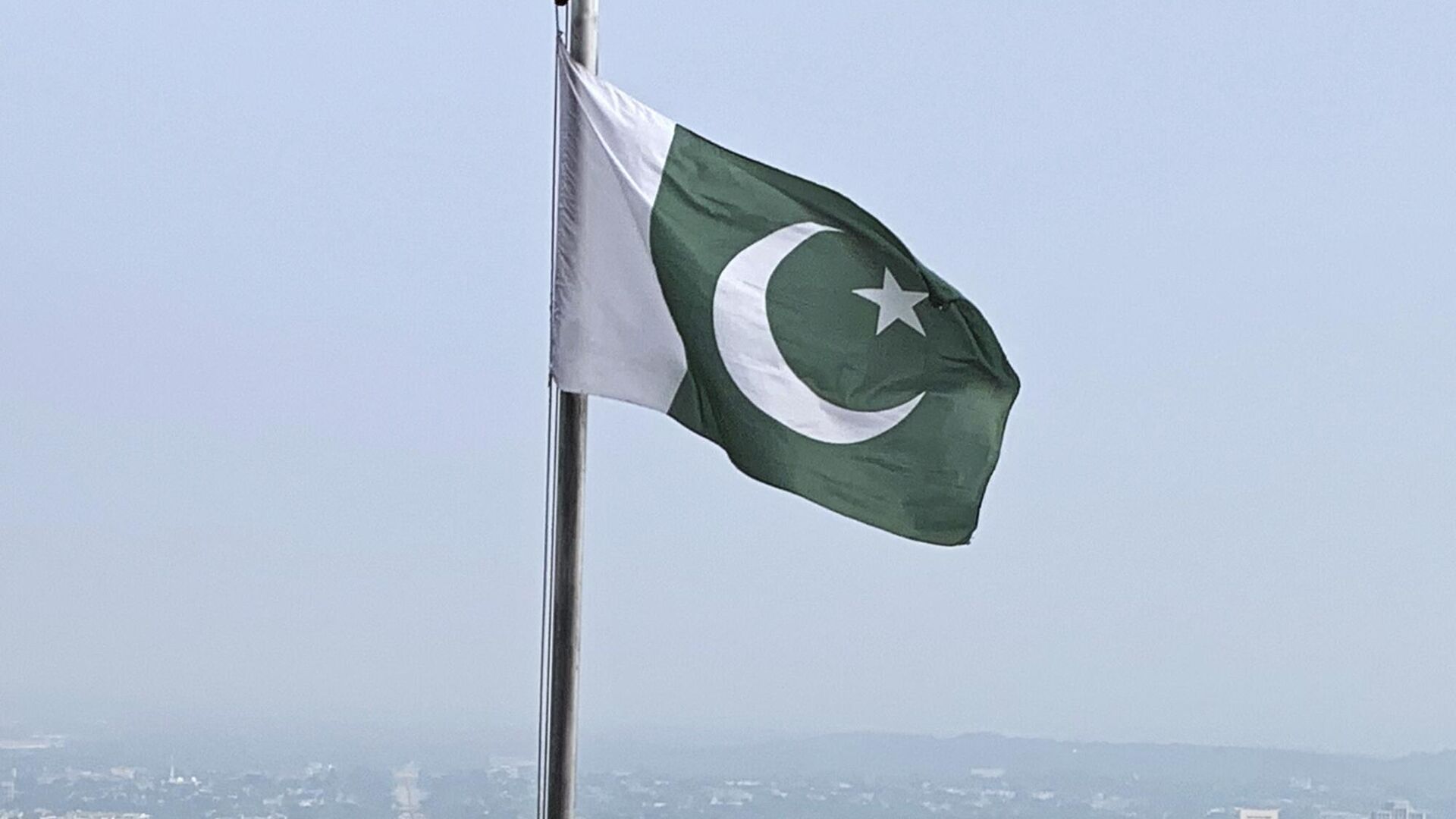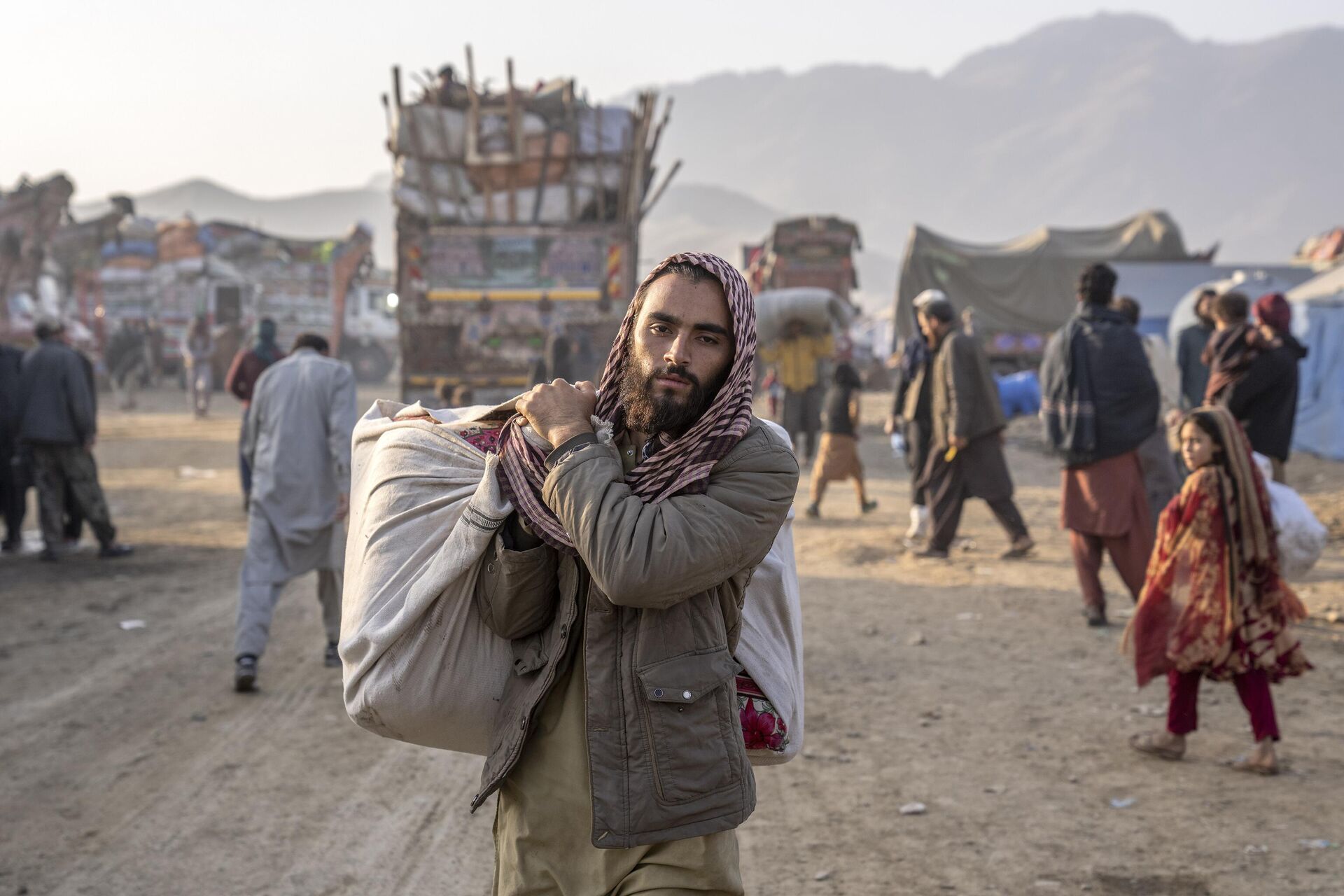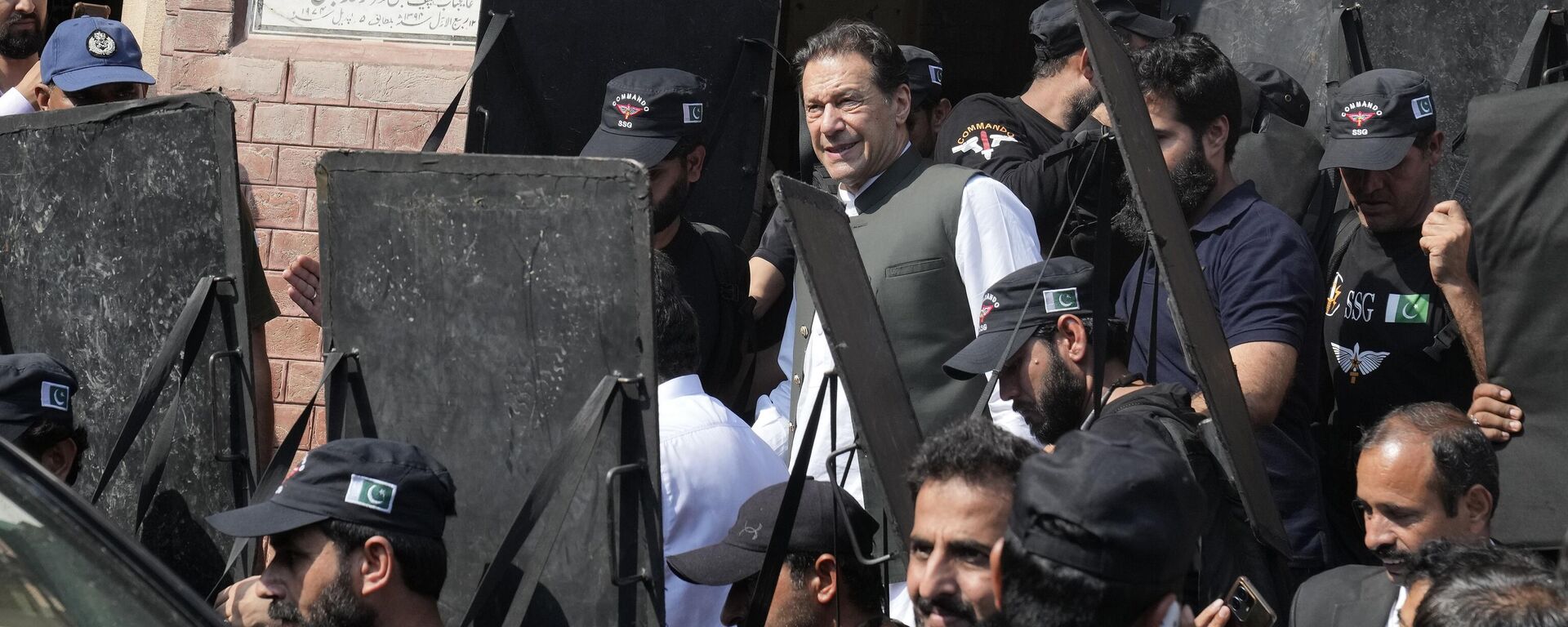https://sputniknews.in/20240207/how-will-upcoming-elections--economic-challenges-impact-pakistans-foreign-policy-6473330.html
How Will Upcoming Elections & Economic Challenges Impact Pakistan's Foreign Policy?
How Will Upcoming Elections & Economic Challenges Impact Pakistan's Foreign Policy?
Sputnik India
The upcoming elections could bring about significant changes in Pakistan's foreign policy. Sputnik discussed possible scenarios with political analysts, noting that the actual impact will only become clear after the elections.
2024-02-07T19:37+0530
2024-02-07T19:37+0530
2024-02-07T20:02+0530
imran khan
nawaz sharif
bilawal bhutto zardari
pakistan
india
islamabad
pakistan tehreek-e-insaf (pti)
pentagon
nato
elections
https://cdn1.img.sputniknews.in/img/07e8/01/18/6327234_0:104:2000:1229_1920x0_80_0_0_707202b28f53a252855cf52bee4cb8b8.jpg
The main contenders for the post of prime minister are Nawaz Sharif, representing the centre-right Pakistan Muslim League Nawaz (PMLN), and Bilawal Bhutto Zardari, representing the centre-left Pakistan People's Party. Their foreign policy stances could shape Pakistan's international relations, but it must be noted that the Pakistani military has historically played a significant role in the country's politics. Therefore, its influence on the election results could also indirectly affect foreign policy decisions.According to the writer, Pakistan's former prime minister Imran Khan and his Pakistan Tehreek-e-Insaf (PTI) party are a "spent force without leadership and vote rigging will ensure they don't win".Impact on Foreign RelationsAfter the elections, the new leader will have to deal with one of the country's worst economic crises and an escalating terrorism problem. These domestic issues could affect Pakistan's foreign policy, particularly its relations with its neighbours and international economic partners.Pakistan's relations with India have seen many ups and downs over the years, but India is also due to hold general elections this year, and some analysts argue that another term for Prime Minister Narendra Modi under a Sharif government holds the potential for a normalisation of relations.An Islamabad-based former military chief and economist, speaking on condition of anonymity, told Sputnik that if one looks at relations with China, one can see that Beijing has become one of Islamabad's most important allies, providing billions of dollars of investment through China's Belt and Road Initiative (BRI) global infrastructure project.On relations with Moscow, Nawaz's PML-N party in its recent election manifesto mentioned developing relations with Russia by building on the 'successes' achieved during 2013-18, when the then prime minister Nawaz Sharif was in power.The foreign policy think tanks of both the PMLN and the PPP promised to strengthen ties with Muslim countries, especially the Gulf Cooperation Council (GCC) states such as Saudi Arabia, the United Arab Emirates and Qatar, as well as Iran, Turkey and the Central Asian republics. However, political writer Parvez Salik is more critical of Pakistan's relations with its friends.Hybrid Regime Influencing Foreign PolicyA retired squadron leader in the Pakistan Air Force and security analyst, Fahad Masood, told Sputnik that just as in the United States the Pentagon plays a big role in America's foreign policy, in Pakistan too, the military plays a strong role in politics and foreign policy.He added that, in his view, the Pakistani military had often been guided by Western powers such as the US, the UK and NATO.The Pakistan Army Act 2023, amended by the coalition government after Imran Khan's removal from power, criminalised criticism of the military, especially by retired soldiers. Chief of Army Staff Asim Munir was appointed to a new council aimed at attracting foreign investment and boosting economic growth.It is therefore highly likely that Pakistan's foreign policy will continue to operate under this hybrid regime, with the military and the elected government working side by side to improve Pakistan's external standing and revive its economy.Main Pressing Issue for PakistanThe damaging effects of inflation over the past year and a half have been a major problem for the country, leading economists to stress the need for the new government to recalibrate its priorities.A record 30% inflation rate has pushed more than 40% of Pakistan's population below the poverty line. The 2022 monsoon floods destroyed factories, roads, villages and acres of farmland. Unemployment is rampant in the country and last year Pakistan witnessed a mass exodus of around 1 million people, mostly youth, leaving the country in search of better job prospects.An Islamabad-based former military chief and economist, speaking on condition of anonymity, told Sputnik that the wrong policies could endanger the delicately balanced economy, potentially leading to a crisis and default.
https://sputniknews.in/20240205/what-does-imran-khans-latest-conviction-mean-for-pakistans-political-system-6447745.html
pakistan
india
islamabad
Sputnik India
feedback.hindi@sputniknews.com
+74956456601
MIA „Rossiya Segodnya“
2024
Aneela Rashid
https://cdn1.img.sputniknews.in/img/07e6/0c/0d/74548_0:0:485:484_100x100_80_0_0_821526e967ae85d041e2d30ee34fa1de.jpg
Aneela Rashid
https://cdn1.img.sputniknews.in/img/07e6/0c/0d/74548_0:0:485:484_100x100_80_0_0_821526e967ae85d041e2d30ee34fa1de.jpg
News
en_IN
Sputnik India
feedback.hindi@sputniknews.com
+74956456601
MIA „Rossiya Segodnya“
Sputnik India
feedback.hindi@sputniknews.com
+74956456601
MIA „Rossiya Segodnya“
Aneela Rashid
https://cdn1.img.sputniknews.in/img/07e6/0c/0d/74548_0:0:485:484_100x100_80_0_0_821526e967ae85d041e2d30ee34fa1de.jpg
nawaz sharif, bilawal bhutto zardari, pakistan muslim league nawaz (pmln), pakistan people's party, foreign policy, pakistani military, election influence, parvez salik, imran khan, pakistan tehreek-e-insaf (pti), jail, popularity, economic crisis, terrorism, india relations, china relations, belt and road initiative (bri), russia relations, gulf cooperation council (gcc), iran, turkey, central asian republics, afghan refugees, hybrid regime, military influence, democracy, pakistan army act 2023, inflation, poverty, monsoon floods, unemployment, exodus.
nawaz sharif, bilawal bhutto zardari, pakistan muslim league nawaz (pmln), pakistan people's party, foreign policy, pakistani military, election influence, parvez salik, imran khan, pakistan tehreek-e-insaf (pti), jail, popularity, economic crisis, terrorism, india relations, china relations, belt and road initiative (bri), russia relations, gulf cooperation council (gcc), iran, turkey, central asian republics, afghan refugees, hybrid regime, military influence, democracy, pakistan army act 2023, inflation, poverty, monsoon floods, unemployment, exodus.
How Will Upcoming Elections & Economic Challenges Impact Pakistan's Foreign Policy?
19:37 07.02.2024 (Updated: 20:02 07.02.2024) The upcoming elections could bring about significant changes in Pakistan's foreign policy. Sputnik discussed possible scenarios with political analysts, noting that the actual impact will only become clear after the elections.
The main contenders for the post of prime minister are
Nawaz Sharif, representing the centre-right
Pakistan Muslim League Nawaz (PMLN), and
Bilawal Bhutto Zardari, representing the centre-left
Pakistan People's Party. Their foreign policy stances could shape Pakistan's international relations, but it must be noted that the
Pakistani military has historically played a significant role in the country's politics. Therefore, its influence on the
election results could also indirectly affect foreign policy decisions.
Speaking to Sputnik India, Parvez Salik, a Scotland-based political writer and analyst, said, "I expect Nawaz to win because the kingmaker in Pakistan's politics is the army and it has reconciled with Nawaz Sharif and can deal with him more comfortably and predictably than the mercurial People's Party."
According to the writer, Pakistan's former prime minister
Imran Khan and his
Pakistan Tehreek-e-Insaf (PTI) party are a "spent force without leadership and vote rigging will ensure they don't win".
However, Khan remains the most popular leader among the masses and many analysts predict that if the elections are fair, Khan's party will sweep the vote. The PTI chairman is currently in jail and barred from contesting the elections, but his party remains quite popular.
Impact on Foreign Relations
After the elections, the new leader will have to deal with one of the country's worst
economic crises and an escalating terrorism problem. These domestic issues could affect
Pakistan's foreign policy, particularly its
relations with its neighbours and international economic partners.Pakistan's relations with
India have seen many ups and downs over the years, but
India is also due to hold general elections this year, and some analysts argue that another term for Prime Minister
Narendra Modi under a Sharif government holds the potential for a
normalisation of relations.An Islamabad-based former military chief and economist, speaking on condition of anonymity, told Sputnik that if one looks at relations with China, one can see that Beijing has become one of Islamabad's most important allies, providing billions of dollars of investment through China's Belt and Road Initiative (BRI) global infrastructure project.
"Although recently some BRI projects, such as the China-Pakistan Economic Corridor, have slowed, a new government could put these projects back on track and potentially accelerate cooperation with Beijing," the economist said.
On relations with
Moscow, Nawaz's
PML-N party in its recent election manifesto mentioned developing relations with
Russia by building on the 'successes' achieved during 2013-18, when the then prime minister Nawaz Sharif was in power.
The foreign policy think tanks of both the PMLN and the PPP promised to strengthen ties with Muslim countries, especially the Gulf Cooperation Council (GCC) states such as Saudi Arabia, the United Arab Emirates and Qatar, as well as Iran, Turkey and the Central Asian republics. However, political writer Parvez Salik is more critical of Pakistan's relations with its friends.
"The recent expulsion of thousands of Afghan refugees that had been living in Pakistan for years also hints at this more assertive, military driven political approach rather than a diplomatic one," Salik stated.
Hybrid Regime Influencing Foreign Policy
A retired squadron leader in the
Pakistan Air Force and security analyst,
Fahad Masood, told Sputnik that just as in the United States the Pentagon plays a big role in
America's foreign policy, in Pakistan too, the military plays a strong role in politics and foreign policy.
"In order for foreign policy to change there needs to be a paradigm shift in Pakistan's political systems wherein the power moves from the military toward the democratically elected government. That is where the challenge lies, that is where Imran Khan also faced his crisis because he was shot down the day he decided to make decisions not in line with the military's stance," Masood said.
He added that, in his view, the Pakistani military had often been guided by
Western powers such as the US, the UK and NATO.
According to a report by Muneeb Yousuf, a doctoral candidate at the Academy of International Studies, Jamia Millia Islamia, "Pakistan has evolved into a hybrid regime where elements of electoral democracy and military influence mix. The election will only mark the next chapter of hybrid rule."
The Pakistan Army Act 2023, amended by the coalition government after Imran Khan's removal from power, criminalised criticism of the military, especially by retired soldiers. Chief of Army Staff Asim Munir was appointed to a new council aimed at attracting foreign investment and boosting economic growth.
It is therefore highly likely that Pakistan's foreign policy will continue to operate under this hybrid regime, with the military and the elected government working side by side to improve Pakistan's external standing and revive its economy.
Main Pressing Issue for Pakistan
The damaging effects of inflation over the past year and a half have been a major problem for the country, leading economists to stress the need for the new government to recalibrate its priorities.
A record 30% inflation rate has pushed more than 40% of Pakistan's population below the poverty line. The 2022 monsoon floods destroyed factories, roads, villages and acres of farmland. Unemployment is rampant in the country and last year Pakistan witnessed a mass exodus of around 1 million people, mostly youth, leaving the country in search of better job prospects.
An Islamabad-based former military chief and economist, speaking on condition of anonymity, told Sputnik that the wrong policies could endanger the delicately balanced economy, potentially leading to a crisis and default.
"Politicians must stop pursuing narrow interests, otherwise the military establishment will continue to pull the strings of any government that comes to power in Pakistan. The problems facing the country today cannot be solved by military might alone, because there are serious economic problems that have made Pakistan the fourth most indebted country to the IMF. Therefore, foreign policy should focus on reviving the economy, getting rid of the debt, modernising the textile industry and attracting foreign investment. I hope whoever comes to power will pay full attention to the economy."




